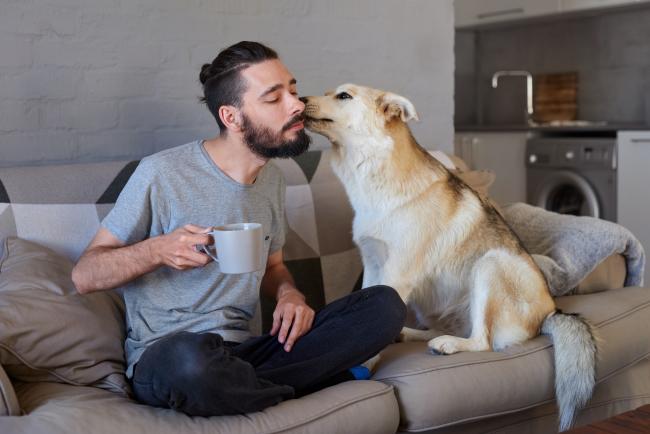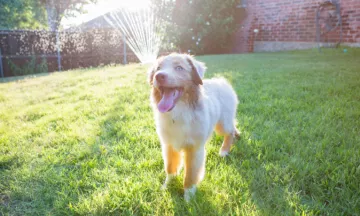Some pets act afraid around men. They become shy, timid, stressed or even aggressive. Why is that happening and what can you do about it?
It is often thought that pets who are afraid of men have had a traumatic experience, for example, abuse when they were young. Although this may indeed be a reason, in many cases this is fortunately not the case and something else is going on.
Why are some dogs afraid of men?
- The dog is poorly socialized with men
- Men have a larger posture / behave more 'threatening'
- Traumatic experience

This dog is not at ease: whites of the eyes are visible and the ears are back
1. Not socialized with men
If a dog has rarely or never come into contact with men while being a puppy, it's likely that they act more afraid of men when he is older, simply because the dog is less familiar with it. Socializing is the development of social behavior towards different people, dogs, and situations. If a dog is not familiar with men from an early age, they can be experienced as more threatening later.
This may not only happen with men but also people with a specific appearance for example men with beards, hoods or hats, people on skateboards, cyclists, runners, etc. Everything unknown to the dog can be extra scary. This all has to do with socialization or getting used to / being familiar with something.
2. Men behave differently
Most women approach dogs in a calm, soothing, and reassuring manner. Men often unconsciously behave just a little differently towards a pet. For example, they look the dog straight in the eye, cheerfully approach the dog for a firm pat on the head and immediately challenge the pet to play. Men are also often taller and have a lower voice.
For pets, this can all come across as threatening. Instead of first approaching cautiously, sniffing around in circles and only then make eye contact, the dog feels immediately dominated.
Another explanation for the fear of men has to do with smell: it is thought that dogs may be more familiar with female hormones from the puppy age - and therefore scent what they are used to from their mother. They naturally feel more confident with women. This is not a scientifically substantiated explanation, but it is plausible.
3. Traumatic experience
When an unpleasant experience happened during the puppy years involving a man, then a pet can be affected by and increase the fear of men for life. This can be something very serious such as abuse, but also a simple incident such as a loud bang when the puppy was with a man.
Dogs that are afraid of men can: squeak, dive away, shake, put their tail between the legs, bark, growl or show their teeth. These are all signals the dog uses to indicate: I want to leave this situation! Always respect stress signals and never force your dog into unwanted contact.
How to reduce the fear of men
The most important step in reducing fear is for the dog to regain confidence. To establish contact between a fearful dog and a man always let your dog set the pace. You want to socialize the dog, not traumatize: that means don't lead the dog suddenly into all kinds of scary situations but let him calmly gain confidence.
You can ask your male friends to help with socializing. Have him ignore the dog and make it himself small by stooping or squatting. That way a man is less threatening. The owner speaks to the dog in an encouraging and comforting way and rewards the dog with some treats if he approaches the man. Take your time to do this by practicing only a few minutes at a time. Your dog sets the pace, you only encourage.

Encountering men on the street
Does your dog bark at men on the street? Try to divert your dog's attention. That can be done by calling his name, a clicking sound or offering a treat. As soon as you see a man coming, cheerfully call your dog's name and reward him. Also, pay attention to your own behavior: sometimes we stiffen when we suspect that our dog will react anxiously or stressed. We unknowingly anticipate this. The dog can, therefore, react to our own behavior, which makes his fear unnecessarily worse or even stimulate a defense response. Stay relaxed and speak to your dog in an encouraging way.
Do you suspect that your dog has had a really bad traumatic experience with men or something else? In that case, you should probably consult with a dog behaviourist. The trauma can be so bad that extra help is needed to turn your anxious or aggressive dog once again into a cheerful and confident animal.
To see all our resources and articles with tips and tricks to keep you and your pet happy visit the Pawshake archives.





